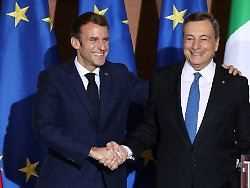Thursday, December 23, 2021
Rome and Paris for new rules
Push for EU license to get into debt
The corona crisis is tearing huge holes in the budgets of EU countries. Overall, a debt ratio of 100 percent is expected. But Italy and France want to loosen the fiscal rules of the euro zone permanently. In order to initiate investments, it is said in Rome and Paris.
France and Italy want to reform the European Union’s financial rules and make it easier to borrow for investments. French Prime Minister Emmanuel Macron and Italy’s Prime Minister Mario Draghi wrote in a guest article in the “Financial Times” that more room for maneuver and sufficient spending for the future are needed to guarantee European sovereignty. New fiscal rules should encourage borrowing for investments, they urged.
From Elysée circles it was said that the text should trigger a joint debate among the 27 EU countries. There is a broadly shared will to move forward. France, which will take over the EU Council Presidency in January, wants to push the issue further. However, there is no precise schedule. In their contribution, Draghi and Macron referred to an analysis by government advisors, as it was called from circles at the Palazzo Chigi in Rome.
Debt pact suspended until 2023 due to Corona
In view of massive new debts due to the corona pandemic and upcoming investments in climate protection, a redesign of the EU debt rules is currently being disputed at the EU level. The so-called Stability and Growth Pact stipulates that EU states take on no more than 60 percent of their economic output in debt. In addition, the specifications, also known as the Maastricht criteria, stipulate that budget deficits should be capped at three percent of gross domestic product (GDP). However, the pact was suspended until 2023 due to the high corona costs.
According to the so-called Eurogroup, the debt of the euro countries will reach 100 percent of GDP this year, the deficit ratio 7.1 percent. But not all EU countries want to reform the criteria. More economical countries – such as the Netherlands or Denmark – are against it. Chancellor Olaf Scholz from the SPD emphasized during his time as finance minister that the rules were flexible enough. France and Italy had already spoken out in favor of easier borrowing several times in the past.
